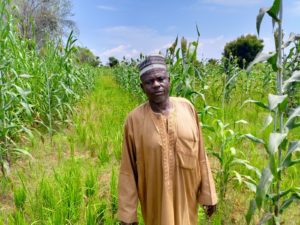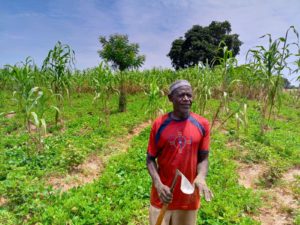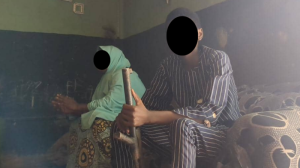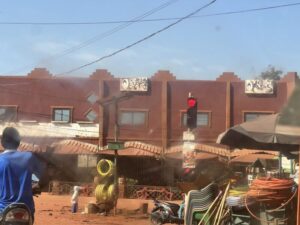In 2018, the Kano State Ministry of Works, Housing, and Transport released N20,179,800 million to Kano Agricultural Supply Company (KASCO) for the provision and supply of three trucks carrying 600 pieces of fertiliser at a cost of N6,105 each in Gabasawa and Garko Local Government Areas.


Each fertiliser truck cost N3,363,300.00 million, for a total of N10,089,900.00 million.
The supplies of fertilisers were meant to be distributed to the farmers in Garko and Gabsawa LGAs in order to improve their harvest.
In this investigative report, Rashida Salihu Ozavize disclosed how KASCO sold the Kampa fertilisers above subsidised rate to farmers.
A voice call to an official telephone contact number on KASCO website revealed that the subsidised fertilisers was N3,500 per bag in 2018.
However, Herald Reporters discovered that KASCO inflated the price with N1,500, making the farmers in Garko to buy the fertiliser at N5,500.
Also in Gabasawa, Investigation uncovered that there was no supply of subsidised fertilsers to farmers, but it was in market for sale.
KASCO
Kano Agricultural Supply Company Limited (KASCO) was established and incorporated as a limited liability company on 30th October 1981 under the Companies Act 1981, now the Companies and Allied Matters Law.
It started operation in early 1982, and the Kano State Government owns the company.
One of the major objectives of the agency is to increase revenue generation, diversify operations by going into projects of livestock feed production, poultry feed, fish feed, horse feed, and dealership.
The company procures and distributes an agricultural input which includes hardware such as irrigation pumps, milling machines, sprayers, oxdrawn-ridgers greenhouse equipment, agro-chemicals which include fertilisers, herbicides, insecticides, and rodenticides to farmers in the state.
It also provides animal medications such as Benozole, Vitacilin, Renide, etc.
KASCO also supplies vegetables /cereal seeds: tomatoes, carrots, watermelon, hybrid maize, Rice, sorghum, etc to smallholder and commercial farmers.
The distribution process of subsidised fertiliser
Discreet investigation findings of the subsidised fertiliser distribution process revealed that the state government through the Agricultural Development Program (ADP) and KASCO have warehouses at local government and ward levels.
Names of farmers who are in need of the subsidised fertilisers would have been selected and collected by the farmers’ association or community leaders for onward transmission to KASCO offices at thee ward level.
In some cases, the LGA Chairmen and others stakeholders also have names of their beneficiaries submitted too.
Depending on the quantity available and the subsidised rate a farmer may get one bag; sometimes 2 or 3 farmers share a bag.
It is the subsidy that determines the quantity of fertiliser a farmer gets. For instance, if the subsidy is less than 20%, there is a probability of a farmer getting one bag is high, but if the subsidy is 50% or 80%, two or three farmers may have to share a bag.
Somehow, the process have been compromised by politician and local government chairmen officials.
On a normal farming morning on Saturday, Usman was on his 4 hectares of rice farmland feeling depressed, worried, and concerned about his farm yield.
“In 2018, KASCO supplied trucks of fertiliser that were stored in their warehouse.
“A large number of farmers flocked to the KASCO office, expecting subsidised fertiliser.

“Every farmer expected fertiliser after the exercise.
Usman said that after that announcement, most farmers returned to their homes or farmlands.
“Immediately after the announcement, I confronted the KASCO staff who announced the message to inquire for the price – he said it was N5,500 per bag.
“The KASCO price was less than the market price, which was selling for N8,000 to N9,000 in 2018.
“I rushed home to sell my three goats and two sheep for N140,000.
“I hurried back to the KASCO office to make a cash payment of N66,000 for the purchase of 12 Kampa fertilisers.
“I spent the rest of the money on urea fertiliser in the market.”
Usman disclosed that he requires 25 of 50kg bags of Kampa fertiliser and urea for his 4 hectare farm of rice, millet, and guinea corn. At least 15 kampas and 10 ureas of fertiliser.
Usman declares low yield
Despite purchasing the 12 bags of Kampa fertiliser, Usman’s recorded low yeild for the 2018 farming season.
According to Usman, to compensate for the low yield, he used the broadcast method of fertiliser application to evenly spread the fertiliser on the farmland.
“After the broadcast method, I was only able to harvest 46 bags of rice; normally, I can harvest over 300 bags of rice.
“Despite spending so much money to get fertilisers from KASCO, my harvest was disappointing, because the cost of the fertilisers from them was high.
“If KASCO had given the Kampa fertilisers at the recommended subsidised rate to farmers, I would have used my money to buy more Kampa and have a bumper harvest.
“The way things are now, I use local manure from animals because the supply of fertilisers has stopped since 2018.”
“My farming has drastically reduced,” he added, “because I cannot farm for commercial purposes but only for subsistence.”
AFAN Offical in Garko lament
The All Farmers Association of Nigeria (AFAN) is the umbrella organisation for all farmers, commodity associations, cooperatives, and other bodies in Nigeria involved in agriculture and agro-allied matters.
Abdulmumin Alhassan, Auditor General of the All Farmers Association of Nigeria (AFAN) Garko Chapter.
He confirmed that fertilisers supplied by KASCO were sold to farmers, despite their efforts to stop the act of selling the fertilisers above subsidised rate.
He explained that “as a farmer’s association, we were aware that KASCO was about to bring fertilisers.
“We are all aware that whenever the government provides fertilisers to farmers, it is usually at subsidised cost.
“However, in 2018, despite our efforts to stop them, the fertilisers supplied by KASCO were sold to farmers at high cost, and they overpowered us because there was political influence in the issue.”
“We went to the Garko Local Government Secretariat’s agricultural department, but we were told that it was none of the LGA’s business.”
“Hearing that we gave up and allowed them to operate their act of selling the fertilisers.”
Alhassan, AFAN, Auditor General, who is also a farmer at the same time in Garko Town and has 15 hectares of farmland, recounted having bought a huge quantity of Kampa fertilisers from KASCO in 2018.
“KASCO sold the fertilisers for us at N5,500 by deducting N2,000 from the market price, which was sold at N7,000.
“I see other farmers buying fertiliser, and I, too, am in need of it, so I decided to buy about 65 bags of Kampa fertiliser for N357,500, which I paid in cash.
“But if the fertilisers were given for free, it would have helped in increasing farm produce. 
For example, on farmland where 50 bags of rice are harvested, the fertilisers could lead to over 120 bags after harvest.
“Currently, I cannot farm the whole of the 15 hectares.
“I barely farm 2 hectares of my farmland due to the recent hardship in the cost of fertiliser and petrol.”
Groundnut Farming going into extinction in Gabasawa
In the early 1960s groundnut production in Nigeria was at its peak.
Gabasawa is one of the LGAs in Kano that produces groundnut in commercial quantities and the farmers believed groundnut farming is a very profitable business to generate profit.
Abdullahi Habibulah, an 87-year-old farmer told Herald reportersthat in those good old days women of different communities in Gabasawa used (What is the method called) a traditional method to extract oil from the crop.
“Also, Gabasawa was part of the LGAs in Kano that produced a large quantity of groundnut used for the known groundnut pyramid in Kano,” Habibulah added.
Today, the cultivation of the crop has gradually dropped as farmers in Gabasawa shared concerns about the government turning a blind eye to their plights.
Umaru Alhassan, a groundnut farmer and member of the Gabasawa Groundnut Producers, Processors, and Marketing Association in Zakirai town, Gabsawa LGA, cultivates five hectares of groundnuts each year.
He said: “I can only boast of 85 to 100 bags after harvesting the crop.” attributing his losses to a low-yielding seed variety and a lack of fertiliser.
He bemoans the lack of incentives for groundnut farmers in Zakirai, emphasising that the state government fails to recognise the importance of the crop.
He said: “Even when we were using local manures to farm groundnuts, I had a moderate harvest.
In an interactive session with Alhassan to know if he was aware of the provision and supply of three trucks of 600 pieces of fertiliser in Gabasawa, he responded that: “Yes, in 2018, I was aware of the supply of Kampa fertiliser to be given by KASCO.
“I learned about the supply from a friend of mine who is a KASCO official in Gabasawa.
Umaru Alhassan, a groundnut farmer and member of the Gabasawa Groundnut Producers, Processors, and Marketing Association in Zakirai town, Gabsawa LGA. PC: Herald Reporters.
“Around the middle of September 2018, our community elders made a public announcement that all farmers should gather at the KASCO office in Gabasawa to submit their names.”
“I rushed from Zakirai town to Gabasawa on my bicycle at 6 a.m., a distance of about 20 kilometres, to write my name so I could be one of the beneficiaries of the fertiliser.
“As far as I am aware, no fertiliser has been supplied to date, but our association has made efforts to follow up, but there have been no positive outcomes.”
He said: “In 2018, the non-supply of fertiliser affected my groundnut farming, resulting in a poor harvest and affecting the value chain of the crop,”
The farmer pointed out that a hectare of groundnut farmland that was producing between 30 and 35 bags now produces only seven bags.
“My groundnut yield would have been more than 50 bags if I got the supply of fertilisers from KASCO, particularly Kampa at the subsidised rate.”
KASCO supplied fertilisers to farmers in 2011
In Gabasawa town, Mallam HaliruDahi, the Vice Chairman of the All Farmers Association of Nigeria (AFAN), told Herald Reporters that the state government has failed to supply fertilisers to farmers in Gabasawa LGA communities for the past 12 years.
Dahi, who is also the Chairman of Fadama, a farmer’s association that promotes development in agriculture, irrigation, livestock, and aquaculture, shared harrowing stories about how the lack of fertiliser supply significantly affects smallholder farmers.
“Farmers in Gabasawa LGA’s local communities are seriously suffering from low yields due to the non-application of fertiliser to their crops.
“From 1999 to 2011, farmers were given free and subsidised fertiliser by the State Government.”
“Farming was expanding, and farmers were producing more crops for commercial purposes.
“For example, in a hectare of groundnut farmland, 50 to 60 bags are being harvested, whereas now it is difficult to harvest 30 bags.

“But after the regime of Mallam Ibrahim Shekarau in 2011, there has not been any supply of fertiliser to farmers.
“On many occasions, the state government has asked me to compile the names of farmers who will benefit from the supply of fertilisers.
“However, in the end, they turn out to be false promises.
“Farmers are currently suffering from low yields due to the government’s lack of support,” he explained.
Dahi revealed that: “Most times whenever KASCCO has fertilisers for either free or at subsidised rates for farmers, somehow, the farm input finds its way to the market.
“We later discovered that the process of distributing the fertilisers is being compromised or politicised as many farmers may not have money to buy fertilisers even at the subsidised rate.
“The agency involved in the distribution then divert the fertilisers and sold it to some selected businessmen in Zakirai Market. By so doing, the price of the farm input gets inflated in the market to the extent that a smallholder farmer cannot afford to buy.”
Herald Reporters spoke to one Alhaji Mahmud MammanZakirai, a dealer of fertiliser in Gabasawa.
He denied: “We don’t buy fertilisers from any government agency.”
“But for those who are close to politicians they can get fertilisers that are meant to be distributed to farmers at a subsidised rate.
“But, personally I donot patronise such kind of government products.”
KASCO Ignores FOI
On September 26, 2023, a Freedom of Information (FOI) was sent to KASCO by this reporter, but the FOI was not received and attended to.

The FOI request was sent via KASCO’s mail address info@kasco.com.ng around 10:20 a.m. on the same day. The mail delivered, but KASCO is yet to acknowledged receipt.

Again, Herald Reporters called a phone number obtained from KASCO’s website. Nobody picked the several calls from the other end.
And, a text message was sent an up to the time of filling this report no response was received.
We are tired of fake promises – AFAN Gabasawa
Mallam Haliru Dahi, Vice Chairman of the All Farmers Association of Nigeria (AFAN), Gabasawa Chapter, stated, “I am tired of submitting names of farmers for any intervention because the process is unfair.”
“As a body, we will continue to strive and see that farmers in Gabasawa get relief.”
Another official of AFAN in Garko, the Auditor General, Abdulmumin Alhassan revealed that the farmers’ association is now reluctant as KASCO refused to recognise them.
“This is so, because when we (AFAN) will submit names of farmers in desperate need of farming equipment, but in the end, no one will benefit due KASCO’s attitude to farmers plights, – the process is always politicised.”
Today, Usman in Garko is battling with his farming activities, applying poultry and cow faeces as manure to boost his yield.
He said the application of the faecesis to leverage the cost of fertiliser, which is being sold at N27,500 in the village market.
In Gabasawa, Alhassan is suffering from a poor harvest of groundnuts.
He said: “I plant more guinea corn than groundnut because I cannot sustain farming anymore due to the fact that the government is not helping farmers and the cost of fertiliser is increasing by the day.
“To buy 50kg of Kampa, it costs N28,000. For now, I have decided to continue using animal faeces as fertiliser, which also contributes to the low yield of my groundnuts,” he added.
This publication was supported by the Wole Soyinka Centre for Investigative Journalism (WSCIJ) through Stallion Times under the Collaborative Media Engagement for Development Inclusivity and Accountability Project (CMEDIA) funded by the MacArthur Foundation.



